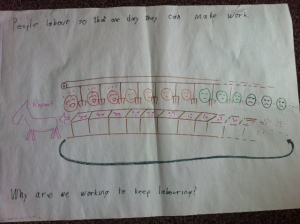Mid-term break seemed like a good time for an update on my ongoing pedagogical experiment in teaching political theory via a series of “translation” exercises. The break is now over, and this post has been languishing in my “drafts” all week because I have been struggling to think about how this fits with the idea of the “flipped” classroom. But I’ll save that for a later post.
The course is one in “Contemporary [read: 20th century] Political Theory.” We’ve worked our way through Arendt, The Human Condition and have just started Marcuse, One-Dimensional Man. The class meets 2x/week, and the assigned reading averages 50pp/class, or 100 pp/week.
Most classes, the first half is spent discussing the assigned reading. It is a small enough class that I don’t have to do too much lecturing, and we have just enough time to focus on figuring out a few key concepts. I’m (sometimes acutely) aware that we don’t have time to fully explore the texts, and I’m sure lots of important ideas could be explained and assessed more rigorously. But I’ve cut this to carve out time for the translation exercises… In the second half of the class, students are given exercises that get them to think about how the abstract concepts we’ve been figuring out might be mobilized in domains other than a political theory course. Some examples, and then a few words on why I am doing this.
In one class, where the assigned reading was the chapter on “Labour” (Chapter II) of Arendt’s The Human Condition, working in small groups, students were told to make a poster that conveyed Arendt’s message. Here is one example.
A couple of chapters later, each student wrote a postcard, from 2014, to Arendt. In the next class, the postcards were distributed to groups of students, who had to write a response (what would Arendt say?) on the back of the postcard. Here are a couple of examples (messages to HA on the left, responses on the right – note that the ones shown don’t specifically correspond with each other).
The last few minutes all the cards were circulated and we had a brief discussion of them. Among other things, we learned that Arendt can be snarky (bottom right is just one example)!
For the last class on Arendt, students (again working in small groups) had to write a brief convocation address from Arendt to the class of 2014. Props to the group that mashed up Arendt’s ideas with the Dr Seuss classic “The Places You’ll Go.”
Congratulations!
Today is your day.
You’re off to Great Places!
You’re off and away!You have brains in your head.
You have feet in your shoes.
You can steer yourself
Any direction you choose.Do more then survive,
Do more than merely live,
Take action to assign value and meaning.You’ll look up and down streets. Look ‘em over with care.
About some you will say, “I don’t choose to go there.”
With your head full of brains and your shoes full of feet,
You’re too smart to let technology develop things that [don’t? -Ed.] allow us to access the truth.And you may not find any
You want to create,
In that case, of course,
Just vita activa all day.OH!
THE PLACES YOU’LL GO !I’m sorry to say so
But, sadly, it’s true
That Bang-ups
And Hang-ups
Can happen to you.You can get all hung up
In a labory-lurch
And your life will fly by
You’ll be left in a hearse.And will you succeed?
Questionable… but you might indeed!(Insert some scientific formula that leads to a percent)… guaranteed!
HOMO FABERS WILL MOVE MOUNTAINS!
So…
Be your name Biro or [names of students redacted]
Or [names of other students redacted]
You’re off to Great Places!
Today is your day!Homo faber is waiting.
So… get on your way!
So after half of a semester: I will acknowledge that effectively cutting the time that we have to discuss the texts directly means that students are probably losing something in terms of the depth of their understanding of the texts. Or at least, the students who would be most engaged in class discussions are. I do sometimes leave class wishing we had an extra half-hour to dig further into some particular concept or other, to make sure they really “get” it. Arendt scholars might well be horrified by mis-readings found in the examples above. The skill of reading opaque or polysemous texts closely is often developed in political theory classes, and I do worry that students might not be getting enough of that.
But. These are rich texts, and I suspect I would have those worries no matter how much time we spent on them. And If they really are intrigued by the ideas in the text, they can always go back to it (and they do have to show understanding of the texts through writing assignments). But I take the point of an undergraduate political theory course not to be the production of professional “theorists,” who have developed and internalized careful interpretations of particular canonical thinkers and texts. I think it is more just getting them comfortable with theory: abstraction, conceptual thinking and analysis, political vision. In an interview with Michel Foucault, Gilles Deleuze described theory as “a relay from one practice to another” and “like a box of tools… it must be useful” and (citing Proust) “necessarily an instrument for combat.” So: not “theorists,” but people who can and will use theory. In order to see it as a tool, we have to practice wielding it.



Pingback: Teaching & Translating Marcuse: Making the Critique of One-Dimensionality Accessible | andrewbiro
Pingback: Frantz Fanon: The Board Games | andrewbiro
Pingback: Electronics in the Classroom | andrewbiro
Pingback: Adorno: A Reading List | andrewbiro
Pingback: Media theory in memes | andrewbiro
Pingback: Media theory in memes (updated) | andrewbiro